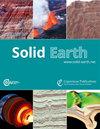协调北亚平宁山脉(意大利)的后成因断层、古应力演化和结构继承:蒙蒂-马尔塔尼断层系统的启示
IF 2.7
2区 地球科学
Q1 GEOCHEMISTRY & GEOPHYSICS
引用次数: 0
摘要
摘要构造继承对不同构造背景下断层系统的演化起着重要作用。在造山运动周期中,造山运动前伸展断层的正向再活化和同步造山运动逆断层的负向再活化都得到了广泛的研究和记录。相比之下,只有极少数研究探讨了构造继承对经历多相构造历史的地区的影响。在此,我们以蒙蒂马塔尼断层系统(MMFS)(意大利亚平宁山脉北部)为例,介绍了一个地震活跃地区的研究情况,在该地区,我们可以研究成因前构造特征对成因后构造演化的影响。根据控制该系统上新世-第四纪演化的伸展断层的新野外构造数据,我们提出 MMFS 并不像以前文献中提出的那样由一条长达数公里的 L 型单一正断层组成,而是由几条呈 NW-SE 走向的较短伸展断层组成,呈 "en-echelon "型排列。古应力分析得出了上第四纪后成因扩展过程中三个不同的延伸方向,即东北-西南、东北-西南和西北-东南。我们将前两个方向与区域应力场的局部取向波动以及适度倾斜的继承构造特征联系起来,而后一个方向则与一个短效的造山带平行延伸事件有关,其地球动力学原因尚不清楚。我们认为,NE-SW 区域后成因延伸方向控制着大部分 NW-SE 亚平宁走向延伸断层的走向,而 Monti Martani 海脊的形态构造趋势及其与周围上第四纪 Medio Tiberino 和 Terni 盆地的边界则受 ~N-S 和 ~E-W 前成因(侏罗纪)继承构造特征走向的控制。我们还讨论了这些观察结果对 MMFS 地震构造的影响。我们的研究结果表明,与之前的观点不同,该断层系统不能被归类为一个活跃而有能力的构造特征。本文章由计算机程序翻译,如有差异,请以英文原文为准。
Reconciling post-orogenic faulting, paleostress evolution and structural inheritance in the seismogenic Northern Apennines (Italy): Insights from the Monti Martani Fault System
Abstract. Structural inheritance plays a significant role upon the evolution of fault systems in different tectonic settings. Both positive reactivation of pre-orogenic extensional faults and negative reactivation of syn-orogenic reverse faults during orogenic cycles have been extensively studied and documented. By contrast, only few studies have addressed the impact of structural inheritance in regions undergoing polyphase tectonic histories. Here, we present the Monti Martani Fault System (MMFS) case study (Northern Apennines, Italy) as an example of a seismically active region where it is possible to investigate the role of inherited pre-orogenic structural features upon the post-orogenic tectonic evolution. Based on new field structural data from extensional faults that controlled the Plio-Quaternary evolution of the system, we propose that the MMFS does not consist of a kilometer-long L-shaped single normal fault, as previously proposed in the literature, but is instead a set of several NW-SE trending shorter extensional faults arranged in an en-echelon style. Paleostress analysis yielded three distinct extension directions during the Plio-Quaternary post-orogenic extension, which are NE-SW, NNE-SSW and NW-SE. We relate the first two directions to local orientation fluctuations of the regional stress field interacting with moderately oblique inherited structural features, and the latter direction to a short-live orogen-parallel extensional event whose geodynamic causes remain unclear. We suggest that the NE-SW regional post-orogenic extension direction controls the strike of most of the NW-SE Apenninic-trending extensional faults, while the morphostructural trend of the Monti Martani Ridge and of its boundaries with the surrounding Plio-Quaternary Medio Tiberino and Terni basins is controlled by the strike of the ~N-S and ~E-W pre-orogenic (Jurassic) inherited structural features. We also discuss the implications of these observations upon the seismotectonics of the MMFS. Our findings suggest that, in contrast to previous suggestions, the fault system cannot be classified as an active and capable structural feature.
求助全文
通过发布文献求助,成功后即可免费获取论文全文。
去求助
来源期刊

Solid Earth
GEOCHEMISTRY & GEOPHYSICS-
CiteScore
6.90
自引率
8.80%
发文量
78
审稿时长
4.5 months
期刊介绍:
Solid Earth (SE) is a not-for-profit journal that publishes multidisciplinary research on the composition, structure, dynamics of the Earth from the surface to the deep interior at all spatial and temporal scales. The journal invites contributions encompassing observational, experimental, and theoretical investigations in the form of short communications, research articles, method articles, review articles, and discussion and commentaries on all aspects of the solid Earth (for details see manuscript types). Being interdisciplinary in scope, SE covers the following disciplines:
geochemistry, mineralogy, petrology, volcanology;
geodesy and gravity;
geodynamics: numerical and analogue modeling of geoprocesses;
geoelectrics and electromagnetics;
geomagnetism;
geomorphology, morphotectonics, and paleoseismology;
rock physics;
seismics and seismology;
critical zone science (Earth''s permeable near-surface layer);
stratigraphy, sedimentology, and palaeontology;
rock deformation, structural geology, and tectonics.
 求助内容:
求助内容: 应助结果提醒方式:
应助结果提醒方式:


